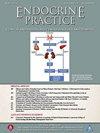Long-Term Impact of Thyroid Eye Disease on Quality of Life: Insights From a Retrospective Cohort Study
IF 3.7
3区 医学
Q2 ENDOCRINOLOGY & METABOLISM
引用次数: 0
Abstract
Objectives
Thyroid eye disease (TED) seriously affects patients’ quality of life (QoL), even if the disease is stable and nonactive. Data on clinical factors negatively influencing the QoL of patients with TED and long-term outcomes are limited. This study aims to evaluate the lasting impact of TED on QoL, focusing on the effects of previous TED treatments and identifying factors influencing long-term outcomes.
Methods
A retrospective cohort study included 151 patients treated for active, moderate-to-severe and severe TED, with a mean follow-up of 8 years.
Results
Higher clinical activity scores at diagnosis correlated with lower QoL scores. Thyroidectomy before immunosuppressive treatment was associated with lower QoL and an increased likelihood of orbital decompression. Any disease progression necessitating second-line treatments also negatively affected QoL. A decrease in thyrotropin receptor antibodies during active treatment and early treatment initiation positively affected visual functioning. Time-dependent regression analysis demonstrated no significant trend in QoL changes over time.
Conclusion
Our data reveal that disease severity, the timing of interventions and disease progression contribute to less favorable long-term QoL outcomes, extending years beyond active treatment. Early and accurate diagnosis and appropriate treatment can minimize poor long-term QoL in patients with TED.
甲状腺眼病对生活质量的长期影响:来自回顾性队列研究的见解
目的:甲状腺眼病(TED)严重影响患者的生活质量(QoL),即使该疾病是稳定和非活动性的。影响TED患者生活质量和长期预后的临床因素数据有限。本研究旨在评估TED对生活质量的持久影响,重点关注先前TED治疗的效果,并确定影响长期结果的因素。方法:回顾性队列研究纳入151例活动性、中重度和重度TED患者,平均随访8年。结果:诊断时临床活动评分越高,生活质量评分越低。免疫抑制治疗前甲状腺切除术与较低的生活质量和增加眼眶减压的可能性相关。任何需要二线治疗的疾病进展也会对生活质量产生负面影响。在积极治疗和早期治疗开始期间,促甲状腺激素受体抗体的减少对视觉功能有积极影响。时间相关回归分析显示,生活质量随时间变化无显著趋势。结论:我们的数据显示,疾病严重程度、干预时机和疾病进展导致较不利的长期生活质量结果,延长了积极治疗后的时间。早期准确的诊断和适当的治疗可以最大限度地减少TED患者的长期生活质量。
本文章由计算机程序翻译,如有差异,请以英文原文为准。
求助全文
约1分钟内获得全文
求助全文
来源期刊

Endocrine Practice
ENDOCRINOLOGY & METABOLISM-
CiteScore
7.60
自引率
2.40%
发文量
546
审稿时长
41 days
期刊介绍:
Endocrine Practice (ISSN: 1530-891X), a peer-reviewed journal published twelve times a year, is the official journal of the American Association of Clinical Endocrinologists (AACE). The primary mission of Endocrine Practice is to enhance the health care of patients with endocrine diseases through continuing education of practicing endocrinologists.
 求助内容:
求助内容: 应助结果提醒方式:
应助结果提醒方式:


